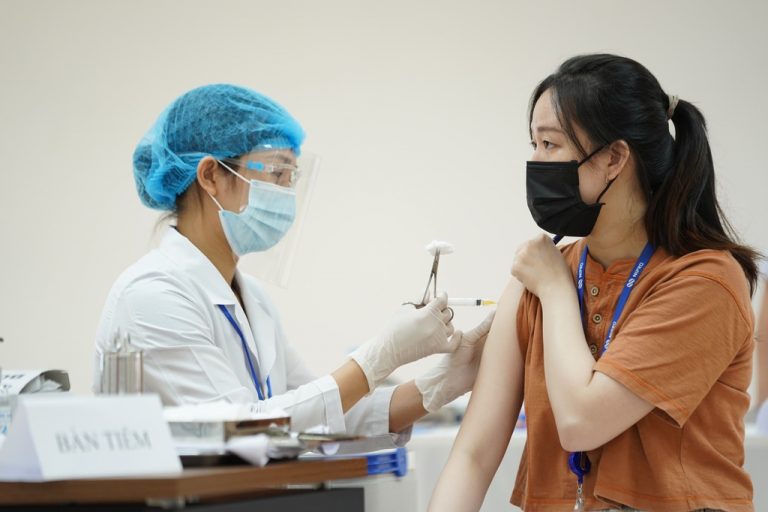AstraZeneca’s Covid-19 vaccine. In this post, we will learn from WHO specialists about the most widely used vaccine in the world.
Currently, the community has many questions concerning the AstraZeneca Covid-19 Vaccine. In this post, we’ll look at what WHO experts have to say about the Oxford/AstraZeneca Covid-19 vaccine. This is also one of the most commonly used vaccines in the world.
Who should be prioritized for the AstraZeneca Covid-19 vaccine?
While vaccination supplies are limited, WHO recommends prioritizing health care workers at high risk of exposure, as well as older persons aged 65 and up.
Who other than the priority groups listed above can receive AstraZeneca Vaccine?
Vaccination is suggested for persons with underlying medical problems known to increase the risk of significant consequences, including obesity, cardiovascular disease, respiratory disease and diabetes.
Although further research is needed in people with HIV, autoimmune disorders, or who are immunocompromised, people in this group are recommended to be vaccinated after receiving information and advice.
COVID-19 survivors can receive the vaccine. Individuals may wish to postpone their COVID-19 vaccination for up to six months from the time of SARS-CoV-2 infection in order to accommodate those who may require the vaccine immediately. Priority should be given to obtaining the vaccine.
Breastfeeding mothers can get vaccinated if they are in a priority vaccination category. The WHO does not advocate discontinuing nursing following vaccination.

Should pregnant women be vaccinated with AstraZeneca Covid-19 Vaccine?
Although pregnancy increases women’s risk of severe COVID-19, there is insufficient research available to assess the vaccine’s safety while pregnant.
Pregnant women may be vaccinated if the vaccine’s benefits outweigh the risks.
As a result, pregnant women who are at high risk of SARS-CoV-2 exposure (for example, healthcare workers) or have comorbidities that enhance their risk of severe sickness may be vaccinated. Vaccination on the advice of a specialist.
Who is AstraZeneca Covid-19 vaccine not recommended for?
People who have previously experienced severe adverse reactions to any component of the vaccine should not be immunized.
Not recommended for those under the age of 18. Wait for the findings of further investigations.
What is the recommended dose of AstraZeneca Vaccine?
The suggested dose is two intramuscular injections (0.5mL each) spaced 8 to 12 weeks apart.
More research is needed to determine the possibility of long-term protection following a single dose.
Is the AstraZeneca Covid-19 vaccine safe?
Two versions of the vaccine developed by AstraZeneca-SKBio (South Korea) and the Serum Institute of India have been added to the WHO emergency use list. The European Medicines Agency (EMA) assessed the vaccination during its SAGE review.
The EMA has thoroughly assessed the data on the vaccine’s quality, safety, and effectiveness, and has recommended conditional marketing permission for people aged 18 and up.
The Global Advisory Committee on Vaccine Safety is a group of specialists who provide independent and authoritative advise to WHO on the topic of safe use of vaccines, receiving and reviewing reports of adverse events. Suspected safety event with possible international repercussions.
How effective is the AstraZeneca Covid-19 vaccine?
The immunogenic vaccination AZD1222 for COVID-19 was 63.09% effective against symptomatic SARS-CoV-2 infection.
Dosing intervals of 8 to 12 weeks increase vaccine effectiveness.
Is the AstraZeneca Covid-19 vaccine effective against new variants?
SAGE has analyzed the known evidence on vaccine effectiveness in a variety of scenarios. SAGE presently supports using the AZD1222 vaccine under the WHO Priority Pathway, even if the viral variations are present in a country. Countries should evaluate the risks and advantages based on their epidemiological situation.
The preliminary findings emphasize the critical need for a coordinated approach to monitoring and analyzing variations and their potential impact on vaccine efficacy. As new data becomes available, WHO will update its recommendations.
Does the AstraZeneca Covid-19 vaccine prevent infection and transmission?
There is no meaningful evidence about the impact of AZD1222 on virus transmission or shedding.
At the same time, it is critical to continue and strengthen public health measures such as mask use, avoidance of contact, hand washing, respiratory tract cleansing, avoidance of crowds, and adequate ventilation.
As of April 19, 2021, the AstraZeneca vaccine is both safe and effective in protecting people from the most significant dangers of COVID-19, such as death, hospitalization, and severe sickness. The Council of International Organizations for Medical Sciences categorizes the occurrence of adverse effects from medications and vaccinations as follows:
- Very common > 1/10
- Common (frequent) > 1/100 and < 1/10
- Uncommon (infrequent) > 1/1000 and < 1/100
- Rare > 1/10000 and <1/1000
- Very rare <1/10000
(According to WHO) – See original here


